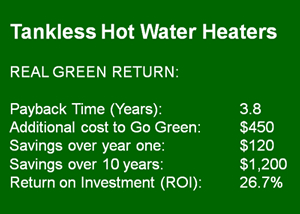
'On-Demand' and 'Flash' are different names for 'Tankless' water heaters that can reduce your hot water heating costs by 50%, with the added bonus of an endless supply of hot water that doesn't run out like the conventional tank system. Heating the water in your house can become rather costly, as it accounts for about 11% of a home's annual energy costs (The average US household cost for hot water is between $200 and $400 per year, depending on the number of residents). This cost is usually hidden in utility bills because homes rarely, if ever, have separate utility meters on hot water systems, so the electric or gas company rolls the usage in with your totals for each month. The savings with a Tankless system are about $100 to $200 per year or between a third and half of your cost. The only downside is that Tankless Water Heaters initially cost about twice as much as the old 'Tank' system, mostly because of the extra labor for installation. Tankless residential units have been coming down in price to compete and they range from $400 to about $800 while the old style 'Tanks' are just a little bit less expensive and typically cost between $400 and $650. A typical Tank installation may cost $200 while a straightforward Tankless installation may cost $500 to $650. So, the average 'Added Cost' to go Tankless is about $450.
The increase in cost for Tankless installation is due to the fact that they typically need to be vented out of homes with stainless steel pipes, because the exhaust air gets very hot as a byproduct of flash heating the water. Since many utility rooms have exhaust for laundry heaters, there is typically an outside wall or window well, or some relatively easy means to exhaust to the outside, but this installation component is a major variable in the payback for any specific home. It is essential to get a free estimate on the installation before buying a Tankless unit.
Once a Tankless hot water system is installed, you start saving money every day. Another advantage for Tankless water heaters is that these units take up to a fraction of the space of their Non-Eco Equivalent Product (NEEP)since they are about the size of a piece of carry-on luggage and mount directly on the wall. Also, since Tankless water heaters do not actually store water, they are not as susceptible to corrosion and last 15 or more years rather than just about ten years like the old style 'Tank' Systems.
In the big picture of green home remodeling, the old concept of keeping a tank heated up to 140 degrees all day everyday is rather inefficient given home use is often concentrated in the morning and evenings, rather than the middle of the day. For instance, we may like to eat pasta, but it doesn't mean we should leave a pot of hot water boiling on the stove all day. You may not have seen a Tankless water heater in the home of a friend or neighbor, but the demand is on the rise given the savings, longer lifespan, and convenience of never running out of hot water. As well, Europeans and Asians have used these systems for years, and improved the technology along the way.
The ROI Calculation is based on a system that produces 7 gallons of hot water a minute - enough for two showers and an appliance such as a dishwasher or clothes washer to run simultaneously. If you are already considering replacing your hot water tank as part of your home remodeling and maintenance, then you'll save even more because you can put the money towards the Tankless 'On Demand' system.
The ROI Data Source:
The ROI calculations are intended to serve as a guide to help you see the hierarchy of performance and payback. Given variations in energy consumption, house size, results will naturally vary. The calculations are based on comprehensive local and national research and a combination of reports from the U.S. Department of Energy, the EPA, ENERGY STAR® for Homes Program, US Green Building Council's LEED for Homes Program, American Council for an Energy-Efficient Economy (ACEEE), International Energy Conservation Code, PLUS information directly from University Studies, Architects, Manufacturer Specifications, Distributors, seasoned Builders and Installers, and Homeowners with actual Performance Feedback.
For more Return on Investment data and details on ways to save money and the environment, look here for Green Interior Home Remodeling opportunities. Every purchase you make is an opportunity to save!

